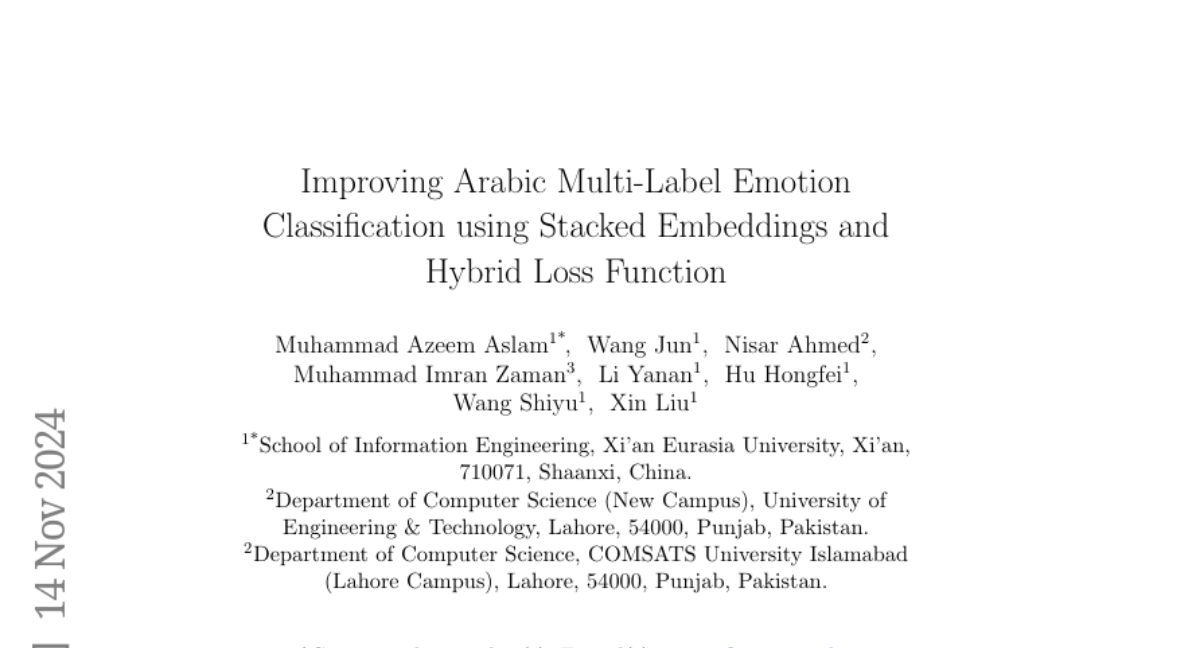Post
2394
🚀 New paper out: "Improving Arabic Multi-Label Emotion Classification using Stacked Embeddings and Hybrid Loss Function"
Improving Arabic Multi-Label Emotion Classification using Stacked Embeddings and Hybrid Loss Function (2410.03979)
In this work, we tackle some major challenges in Arabic multi-label emotion classification especially the issues of class imbalance and label correlation that often hurt model performance, particularly for minority emotions.
Our approach:
Stacked contextual embeddings from fine-tuned ArabicBERT, MarBERT, and AraBERT models.
A meta-learning strategy that builds richer representations.
A hybrid loss function combining class weighting, label correlation matrices, and contrastive learning to better handle class imbalances.
🧠 Model pipeline: stacked embeddings → meta-learner → Bi-LSTM → fully connected network → multi-label classification.
🔍 Extensive experiments show significant improvements across Precision, Recall, F1-Score, Jaccard Accuracy, and Hamming Loss.
🌟 The hybrid loss function in particular helped close the gap between majority and minority classes!
We also performed ablation studies to break down each component’s contribution and the results consistently validated our design choices.
This framework isn't just for Arabic it offers a generalizable path for improving multi-label emotion classification in other low-resource languages and domains.
Big thanks to my co-authors: Muhammad Azeem Aslam, Wang Jun, Nisar Ahmed, Li Yanan, Hu Hongfei, Wang Shiyu, and Xin Liu!
Would love to hear your thoughts on this work! 👇
Improving Arabic Multi-Label Emotion Classification using Stacked Embeddings and Hybrid Loss Function (2410.03979)
In this work, we tackle some major challenges in Arabic multi-label emotion classification especially the issues of class imbalance and label correlation that often hurt model performance, particularly for minority emotions.
Our approach:
Stacked contextual embeddings from fine-tuned ArabicBERT, MarBERT, and AraBERT models.
A meta-learning strategy that builds richer representations.
A hybrid loss function combining class weighting, label correlation matrices, and contrastive learning to better handle class imbalances.
🧠 Model pipeline: stacked embeddings → meta-learner → Bi-LSTM → fully connected network → multi-label classification.
🔍 Extensive experiments show significant improvements across Precision, Recall, F1-Score, Jaccard Accuracy, and Hamming Loss.
🌟 The hybrid loss function in particular helped close the gap between majority and minority classes!
We also performed ablation studies to break down each component’s contribution and the results consistently validated our design choices.
This framework isn't just for Arabic it offers a generalizable path for improving multi-label emotion classification in other low-resource languages and domains.
Big thanks to my co-authors: Muhammad Azeem Aslam, Wang Jun, Nisar Ahmed, Li Yanan, Hu Hongfei, Wang Shiyu, and Xin Liu!
Would love to hear your thoughts on this work! 👇
